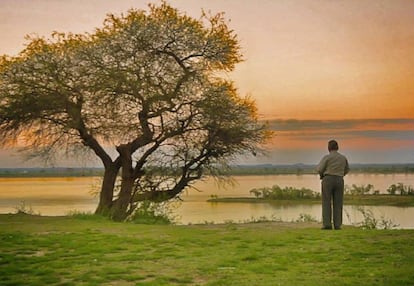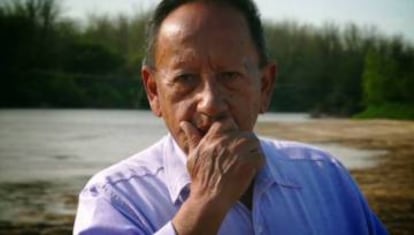The last speaker of Chaná, a language believed to have died a century ago
New documentary keeps culture of indigenous group alive through the testimony of one man

Blas Jaime is the only known speaker left of an indigenous language believed to have died out a cenutry ago: Chaná. He learned it from his mother, who was taught by her mother, who was taught by her mother as part of a secret oral tradition dating back centuries to when the indigenous group was forcibly evangelized by Spanish colonizers on the banks of the Uruguay River in Argentina.

“Native names were banned,” explains Jaime in a new documentary, Lantéc chaná by Argentinean director Marina Zeising. “And they would cut off the tip of the tongues of girls who spoke Chaná.”

This 71-year-old former Mormon preacher didn’t pass the language on to his daughter and for many years did not speak it. His life changed when he revealed he spoke Chaná and researcher Pedro Viegas Barros found out.
“The Chanás do not exist,” was Viegas’s first response. Although skeptical, he traveled from Buenos Aires to Paraná in the south of Argentina to see Jaime. There he found that the language Jaime had retained from nights spent learning with his mother matched the only written testimony of the language of the Chaná. Dámaso Larrañaga wrote the document in 1823 based on interviews with elders from the tribe, which for millennia lived as fishermen, subsisting only with what the river gave them.
The indigenous language was believed to have died out more than 100 years ago
“Timú” says the Chaná to the son. “Atá” is water, “ata má” means river, and “vanatí ata ma” is the children of the river and streams.
“Beada” - Jaime’s favorite word - means mother and “beada á” means Earth. “Vanatí beada,” means the tree is the son of the Earth, while its branches are called “palá.”
The first Chaná-Spanish dictionary was published in 2014
Viegas heard Jaime speak those words for the first time in 2005. From that moment on, they embarked on a journey to reconstruct the language and culture of the Chaná to ensure that it does not disappear. In 2010, the language was added to UNESCO’s Atlas of the World's Languages in Danger. In 2014, the pair published the first Chaná-Spanish dictionary. Zeising’s film is the latest effort to recover the past of one of the many indigenous groups that inhabited the far south of South America before the Spanish arrived.
“When my daughter, Evangelina, decides to take charge of passing on Chaná, I will return to the Church,” says Jaime after seeing the documentary. He narrows his dark eyes, rests on his cane and quietly regrets not having taught his daughter the language when she was a child. When he tried to do so later, his daughter refused.
The Chaná were a matriarchy
“She told me she didn’t want to be an indian,” said Jaime, “and that people were going to abuse and insult her.” This is a common sentiment among descendants of indigenous groups in Argentina, a country that didn’t recognize the rights of its native peoples until 1994. Evangelina changed her mind once she became a mother. She began to study Chaná and now helps her father teach students who want to learn the language.
In addition to knowing Chaná, Jaime would like Argentineans to also adopt some his ancestors’ values. “The main thing would be respect for women,” said Jaime, recalling that the Chaná people were a matriarchy where women were responsible for imparting justice and passing down the culture from mothers to daughters. “We also respect children and Mother Nature. The Chaná believe that the Earth is a living thing and that its blood flows through the rivers and streams,” says Jaime.
English version by Debora Almeida.
Tu suscripción se está usando en otro dispositivo
¿Quieres añadir otro usuario a tu suscripción?
Si continúas leyendo en este dispositivo, no se podrá leer en el otro.
FlechaTu suscripción se está usando en otro dispositivo y solo puedes acceder a EL PAÍS desde un dispositivo a la vez.
Si quieres compartir tu cuenta, cambia tu suscripción a la modalidad Premium, así podrás añadir otro usuario. Cada uno accederá con su propia cuenta de email, lo que os permitirá personalizar vuestra experiencia en EL PAÍS.
¿Tienes una suscripción de empresa? Accede aquí para contratar más cuentas.
En el caso de no saber quién está usando tu cuenta, te recomendamos cambiar tu contraseña aquí.
Si decides continuar compartiendo tu cuenta, este mensaje se mostrará en tu dispositivo y en el de la otra persona que está usando tu cuenta de forma indefinida, afectando a tu experiencia de lectura. Puedes consultar aquí los términos y condiciones de la suscripción digital.








































